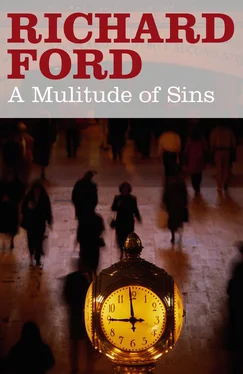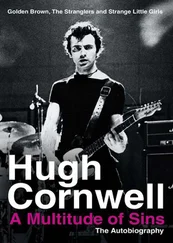Whether to call Jack, though, in London or New York. (Nantucket is out, and Jack never keeps his cell phone on except for business hours.) Where is Jack? In London it was after midnight. In New York it was the same as here. Half past eight. And what message to leave? She could just say she was lonely; or that she had chest pains, or worrisome test results. (These would need to clear up mysteriously.)
But London, first. The flat in Sloane Terrace, half a block from the tube. They’d eaten breakfast at the Oriel, then Jack had gone off to work in The City while she did the Tate, the Bacons her specialty. So far from Snow Mountain Highlands — this being her sensation when dialing — a call going a great, great distance.
Ring-jing, ring-jing, ring-jing, ring-jing, ring-jing. Nothing.
There was a second number, for messages only, but she’d forgotten it. Call again to allow for a misdial. Ring-jing, ring-jing, ring-jing …
New York, then. East Fiftieth. Far, far east. The nice, small slice of river view. The bolthole he’d had since college. His freshman numerals framed. 1971. She’d gone to the trouble to have the bedroom redone. White everything. A smiling and tanned picture of herself from the boat, framed in red leather. Another of the two of them together at Cabo, on the beach. All similarly long distances from Snow Mountain Highlands.
Ring, ring, ring, ring. Then click. “Hi, this is Jack.”—she almost says “Hi” back—“I’m not here right now, etc., etc., etc.,” then a beep.
“Merry Christmas, it’s me. Ummmm, Faith.” She’s stuck, but not at all flustered. She could just as well tell him everything. This happened today: the atomic energy smokestacks, the plastic rubber-tree plant, the Pageant of the Lights, the smorgasbord, Eddie from years back, the girls’ planned move to California. All things Christmas-y. “Ummm, I just wanted to say that I’m … fine, and that I trust — make that hope —that I hope you are too. I’ll be back home — at the beach, that is — after Christmas. I’d love — make that like — to hear from you. I’m in Snow Mountain Highlands. In Michigan.” She pauses, discussing with herself if there was further news worth relating. There isn’t. Then she realizes (too late) she’s treating his voice mail like her dictaphone. There’s no revising. Too bad. Her mistake. “Well, goodbye,” she says, realizing this sounds a bit stiff, but doesn’t revise. With them it’s all over anyway. Who cares? She called.
Out on the Nordic Trail i, lights, soft white ones not unlike the Christmas tree lights in the condo, have been strung in selected fir boughs — bright enough that you’d never get lost in the dark, dim enough not to spoil the mysterious effect.
She does not actually enjoy this kind of skiing either. Not really. Not with all the tiresome waxing, the stiff rental shoes, the long inconvenient skis, the sweaty underneath, the chance that all this could eventuate in catching cold and missing work. The gym is better. Major heat, then quick you’re clean and back in the car, back in the office. Back on the phone. She is a sport, but definitely not a sports nut. Still, this is not terrifying.
No one accompanies her on nighttime Nordic Trail 1, the Pageant of the Lights having lured away the other skiers. Two Japanese were conversing at the trail head, small beige men in bright chartreuse Lycras — smooth, serious faces, giant thighs, blunt, no-nonsense arms — commencing the rigorous course, “The Beast,” Nordic Trail 3. On their rounded, stocking-capped heads they’d worn tiny lights like coal miners to light their way. They have disappeared immediately.
Here the snow virtually hums to the sound of her sliding strokes. A full moon rides behind filigree clouds as she strides forward in the near-darkness of crusted woods. There is wind she can hear high up in the tallest pines and hemlocks, but at ground level there’s none, just cold radiating off the metallic snow. Only her ears actually feel cold, that and the sweat line of her hair. Her heartbeat barely registers. She is in shape.
For an instant she hears distant music, a singing voice with orchestral accompaniment. She pauses to listen. The music’s pulse travels through the trees. Strange. Possibly it’s Roger, she thinks, between deep breaths; Roger onstage in the karaoke bar, singing his greatest hits to other lonelies in the dark. “Blue Bayou,” “Layla,” “Tommy,” “Try to Remember.” Roger at a safe distance. Her hair, she realizes, is shining in the moonlight. If she were being watched, she would at least look good.
But wouldn’t it be romantic to peer down from these woods through the dark and spy some shining, many-winged lodge lying below, windows ablaze, like an exotic casino from some Paul Muni movie. Graceful skaters adrift on a lighted rink. A garlanded lift still in stately motion, a few, last alpinists taking their silken, torchless float before lights-out. The great tree shining from the summit.
Except, this is not a particularly pretty part of Michigan. Nothing’s to see — dark trunks, cold dead falls, swags of heavy snow hung in the spruce boughs.
And she is stiffening. Just that fast. New muscles being visited. Best not to go so far.
Daisy, her sister, comes to mind. Daisy, who will soon exit the hospital with a whole new view of life. Inside, there’s of course been the 12-step ritual to accompany the normal curriculum of deprivation and regret. And someone, somewhere, at some time possibly even decades back, will definitely turn out to have touched Daisy in ways inappropriate and detrimental to her well-being, and at an all-too-tender age. And not just once, but many times, over a series of terrible, silent years. The culprit possibly an older, suspicious neighborhood youth — a loner — or a far too avuncular school librarian. Even the paterfamilias will come under posthumous scrutiny (the historical perspective, as always, unprovable and therefore indisputable).
And certain sacrifices of dignity will naturally be requested of everyone then, due to this rich new news from the past: a world so much more lethal than anyone believed, nothing being the way we thought it was; so much hidden from view; if anyone had only known, could’ve spoken out and opened up the lines of communication, could’ve trusted, confided, blah, blah, blah. Their mother will, necessarily, have suspected nothing, but unquestionably should’ve. Perhaps Daisy, herself, will have suggested that Faith is a lesbian. The snowball effect. No one safe, no one innocent.
Up ahead, in the shadows, a mile into the trek, Shelter 1 sits to the right of Nordic Trail 1—a darkened clump in a small clearing, a place to rest and wait for the others to catch up (if there were others). A perfect place to turn back.
Shelter 1 is nothing fancy, a simple rustic school-bus enclosure open on one side and hewn from logs. Out on the snow lie crusts of dinner rolls, a wedge of pizza, some wadded tissues, three beer cans — treats for the forest creatures — each casting its tiny shadow upon the white surface.
Although seated in the gloomy inside on a plank bench are not school kids, but Roger, the brother-in-law, in his powder-blue ski suit and hiking boots. He is not singing karaoke after all. She noticed no boot tracks up the trail. Roger is more resourceful than at first he seems.
“It’s eff-ing cold up here.” Roger speaks from within the shadows of Shelter 1. He is not wearing his black glasses now, and is barely visible, though she senses he’s smiling — his brown eyes even narrower.
“What are you doing up here, Roger,” Faith asks.
“Oh,” Roger says out of the gloom. “I just thought I’d come up.” He crosses his arms and extends his hiking boots into the snow-light like some species of high-school toughie.
Читать дальше












